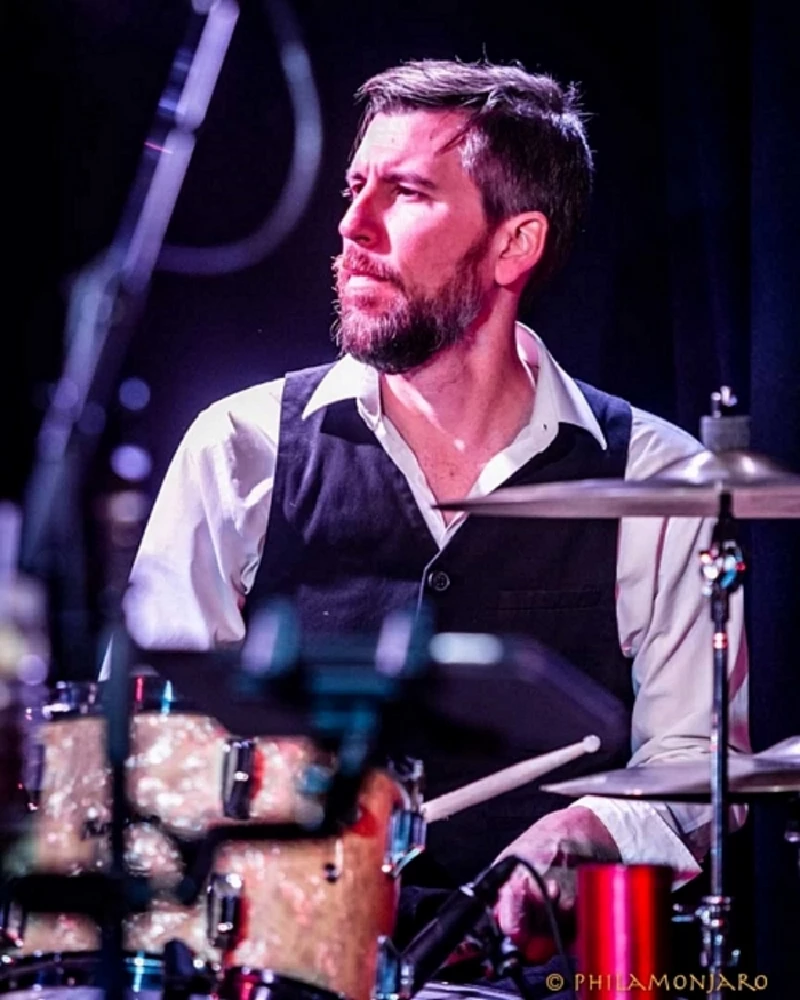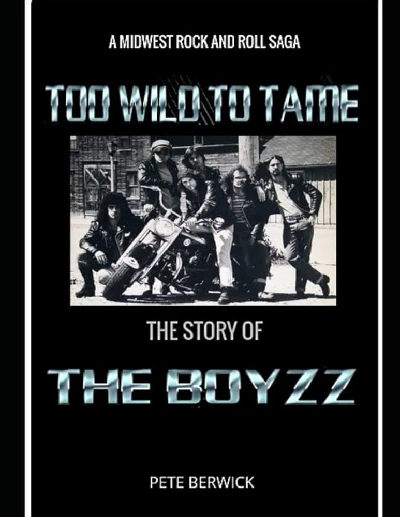Pete Berwick - Interview
by Lisa Torem
published: 10 / 4 / 2020

intro
Singer/songwriter/guitarist Pete Berwick’s triple-threat status is fully explored in his first Pennyblackmusic interview with Lisa Torem.
Pete Berwick’s business card may be slick and compact but it doesn’t reveal what his friends and colleagues already know: Berwick’s most definitely the hardest working man in show business, whether that translates into playing his heart out for late night stretches at a Midwest saloon with FOLSOM, his Johnny Cash tribute band, performing rough-hewn ballads from his most recent release, “Island” or portraying a tough guy in an indie film; all are big-ticket items that may require the man to pull a 24/7 stint and he’ll oblige with no complaint. Clearly, he is multi-sided. For one thing, he’s in superb company with the players that form FOLSOM: vocalist Jennifer McCleary Botka: guitarist/musical director Jason Botka, bassist Johnny Gadeikis and drummer Luke Smith, and on any given night, they’re liable to pack about three-hundred beer-drinking, two-steppers into a glitzy theatre or neighborhood tavern, leaving fans shouting for more. When they play, ‘I’ve Been Everywhere,’ you can’t help picturing Berwick driving all night through the rust belt, only stopping for a shake at an all-night drive through. As his first Pennyblackmusic interview will reveal, Berwick probably invented the term, “all-nighter”. For him, the show doesn’t end when the monitors are unplugged or the stage lights dim. So much of his conviction circles back to forming relationships, which often means chilling with the single parents, college kids and families who cheer him on, as well as the bouncers, bartenders and promoters who get the ball rolling… PB: How did you get your start in the music business? Is anyone else in the family tree musical? PETE BERWICK: Growing up watching television shows like "The Johnny Cash Show" and "The Dean Martin Show" solidified in my mind that I wanted a life in show business. Actually, seeing Dean Martin with a drink in one hand, a smoke in the other and a dame on each arm as he cracked wise and crooned a tune, made me wonder where in the hell one could apply for such a job. I would always be pounding on an old ancient guitar that had been passed on by my grandmother. I wrote my first song when I was about ten and it was awful. I had piano lessons from kindergarten through junior high, and for the most part, hated it. I wish I had stayed with piano, but when my mother gave me the choice of staying with lessons or not, I didn’t even have to think about it. I drove my teachers’ crazy in grade school because I would always be doodling, drawing cartoons and creating fictitious bands and logos for these bands; designing ideas for the next rock band that would be bigger than The Beatles. I hated school and couldn’t wait to get the hell out, so I could form one of the bands I was orchestrating on paper in class, while at the same time, forming my future of sucking at math and science. And yes, all of my family was musical. My dad didn’t play an instrument but he sang so loud in church that he would drown out everyone else. It would embarrass the hell out of me, but seems the apple didn’t fall far from the tree. PB: Was guitar the first instrument that you learned to play? How long have you been playing and who are your major influences? PETE BERWICK: I'd say I learned piano much sooner and more adeptly than guitar. The guitar, I would just pound on and I had no clue as a kid until later, but I was getting fairly fluid on piano, could read music, play waltzes and sonatas and classical music. I had a couple of music teachers that my mother hired. They’d either come to our home or we’d go to theirs. I’d say I was around fifteen when I began to seriously make an effort to learn chords on the guitar, to try to become the next Bob Dylan, who was ground zero for me, and then of course, Johnny Cash. I was into punk music a lot, fascinated by the New York scene, bands like the New York Dolls and Iggy Pop and Mott the Hoople, later on the Ramones. So one moment, I'd be trying to be like Dylan and Cash and the next moment like the Ramones and Iggy Pop. Perhaps this was the birth of my version of cowpunk, I don't know what you'd call it. To me, it's always just been about hammering away until the nail fits. PB: Which of the Cash/Carter songs best compliment your style of singing and your personality? Overall, which of their songs still standup today? PETE BERWICK:: Of course, most people identify and want to hear the old stuff, the classics like ‘Walk the Line’ and ‘Ring of Fire,’ and I never tire of doing them, but for me, I’d say doing some of his later years’ stuff with producer Rick Rubin, like ‘God’s Gonna Cut You Down’ and ‘Rusty Cage’ really puts me in the center of the storm, where these and others like ‘Hurt’ bring it all home, put the focus on the darkness and serious business which is Johnny Cash. I know Cash didn't pen ‘Rusty Cage,’ one of my favorites to perform and I find that even hardcore Cash fans at our shows are pleasantly surprised to see us do it, but he made it his own, as he did all of the cover songs he did. When I do it, I feel as if I wrote it--it's the sort of stuff I've written in the past. Anyway, once Cash records one of your cover songs, it's no longer yours. As far as the older stuff, definitely shit kickers like ‘Big River’ and ‘Hey Porter’ and ‘Wreck of the Old ‘97,’ those in a nutshell, to me, are the essence of cowpunk. I don't know or not if I'm the only one out there who always saw Cash as more cowpunk than country, but to me, he was. He was and always will remain, at least to me, more punk and badass than every safety-pin wearing punk band combined could only dream of being. PB: ‘Island’ is your latest album. Which one of the songs reflect your current state of mind? PETE BERWICK: Well, they all do, obviously. But probably ‘I'm Really Not That Kind,’ at least when I wrote it in 2017, a year or so before I recorded it for ‘Island’. I was in a real dark and depressing place, had just been hit in the balls badly by back-to-back show business defeats and sat down to put it into feelings and words, and out of my heart came a very dark and cynical and jaded song. Then again, there’s some cautious optimism and hope on that album, and some critics have mentioned that was a sign that “Pete Berwick is mellowing.” Funny how I’m suddenly mellow because I stopped for at least one album writing about mostly negative stuff, but it is what is, at whatever point of life we stumble into. PB: As a songwriter, what topics intrigue you the most? What comes first: the melody or lyric? PETE BERWICK: Definitely the melody, often with the title already decided. If it's a strong and solid melody, I know it's only a matter of getting the lyrics right. It would usually take much longer to hone and tweak the lyrics, but sometimes the melody I created out of the box would take more work and a different turn, and for the better, or I’d never record it. I’ve got songs on some of albums that I wrote decades ago, that I gave up on and just let sit, then I’d come back and revisit them, and knew how to finish writing them. This is where patience comes in. Very few five-year-olds write meaningful songs, and I could say the same for some of the ideas I was attempting to formulate in my twenties. Sure, I was taking a beating, trying to make it big, playing to near-empty clubs a hundred miles from home for the door, which would be twelve bucks for the entire band, but I still hadn’t been through enough hell, there would be miles and miles of hell and dues to go, waiting patiently before me. A song I wrote in 1986 ended up on an album I recorded in 2013, because by then I had been kicked in the balls enough times to re-write the lyrics to where I felt it and the listener believed it. PB: Many musicians say that being a band member is tantamount to being in a marriage. That said, what qualities does one need to be a successful band member? PETE BERWICK: Man, it's rough keeping a band going, and there's nothing easy about it. Much easier not doing it all, so much less stress and anxiety and more peace of mind. But it really helps to respect each other and be understanding with the lives and personal issues of your bandmates and to realize that you can't win all of the disagreements. I've learned from the mistakes of my past and try not to repeat them. Impatience has always been a weakness of mine. Even as a kid in school I recall sitting there wishing the teacher would get to the point and my entire life has been one of trying to get to this invisible point, this place where I feel that the question has been answered. Huh? Don't ask me. It helps to have members who are low maintenance, who do their homework and come to rehearsal prepared. FOLSOM consists of highly experienced and professional musicians, and they make it a lot easier for me than some of my many band members through the decades, who were not focused or prepared at rehearsal, or brought their problems to the show or didn't share the same vision as myself. The thing is with FOLSOM, it's not about us, it's about the music of Johnny Cash. We're merely messengers, and you either work toward the goal of selling it to the people or you don't. So everyone understands what needs to done, just like any other business that you don't want to see fall apart. It's a great responsibility being messengers of the music of the iconic Johnny Cash, and none of us take it lightly. PB: Having been in the music business for about forty years, you have most likely witnessed a lot of changes. How have these changes affected your career and those of your colleagues? PETE BERWICK: Well, you work hard beginning around 1976, and pay the dues year after year, decade after decade in order to build a name. Sleeping in your car and driving from town to town and just being plain miserable, but never giving up, because you've been led to believe that "You can't sing the blues until you pay the dues." And the dues never, ever stop, you are always paying them, even now I am. There's no point of arrival where most artists can say, "Hey, I've made it." Even the famous ones, many of them remain miserable, because they are not satisfied with their work, no artist ever completely is. So you work and you sweat and you toil and you bleed and you sacrifice, and then one day you look up and some embryo with a YouTube channel is famous and with a gazillion "followers," as if that is supposed to be and mean the same as packing a club or putting out a critically-acclaimed album that took you years to write. But of course, that's all an illusion anyway; internet fame is to stardom what pornography is to love. I'm very old school, and though so much of what I have always stood for and believed in is now considered ancient ways of doing things, I still do them. Instead of blindly and non-personally spamming club owners for a booking, I go into the establishment and sit at the bar and have a beer, crack jokes to the bartender and if the manager is there, ask him about his wife and kids. We live in a cowardly and lazy ADD age, where so many want the success without the work. I know musicians and actors trying to be famous who have thousands of Twitter followers but can't afford a car, and rarely work. My social stats, hell, I've had album reviewers turn down my records for review because my online stats weren't high enough. And while these douchebags would be telling me that, I'd be turning down more work than I could handle. I am not crazy about these times, but I am grateful I was able to grow up and live most of my life without a "smartphone" stuck up my ass all day and night. I still don't own a smartphone, and never will if I can help it. This is a business of relationships, not telemarketing. Many of the shows I book with FOLSOM are a direct result of relationships and friendships I have established and nurtured with various agents and concert promoters since the early ‘80s. PB: At this point in your career, how do you measure success? PETE BERWICK: I'd say, just being certain that when you get out of bed every day you know that you will be spending it doing what you were put on this planet to do. Knowing you are spending each and every day living on your own terms and not the terms of some outside force, or terms you settled for. Most of my dreams have been realized, and though on a smaller scale than my wild-eyed imagination had formulated in my naive and greedy mind, with age and wisdom I have come to understand that success is so very damn relative. So many people these days want instant fame, the fame without the years and decades devoted to the craft and the art. And you wonder why depression in young people is so prevalent, why so many go to bed each and every night feeling empty and non-fulfilled. I know it is clichéd as hell, but you know, success truly is the journey and not the destination. God has somehow allowed me to still be alive at sixty-two, when so many things should have killed me by now. If you stay standing, and pursue your dream and passion relentlessly, always studying and reading and honing your craft and finding new and better ways to approach things and evolving as an artist, or at whatever it is you do and love, you will be successful. And even if it's just in your own mind, that's fine. It's your happiness, not theirs. PB: The Song ‘Walk the Line’ is open to interpretation. In what way, have you "walked the line?" PETE BERWICK: Well, I did it fairly well for the cop who pulled me over recently. Other than that, it's a pretty tough title; on the surface it might sound like a guy who walks the walk and doesn't bend, when actually it's about, at least to me, a man who compromises. It's a perfect love song, a song about being true and keeping tabs on your heart and being aware, keeping your eyes open, sacrificing. I'd say it's about growing and evolving as a person and in your relationships. Other than the cop, seriously, I've been faithful and married to the same woman for over thirty years, so when I sing that song I don't have to pretend to not be a hypocrite. Also, for the record, ‘Walk the Line’ is a much harder and trickier song to perform than it looks. There's four key changes. That's more than enough work and focus to keep any musician walking the line! PB: What's in the professional future for Pete Berwick? PETE BERWICK: Just to keep on going, doing it every day and remaining a workaholic. I could use a vacation, haven't had a proper one in over seven years, but my work is my life. I’ll have plenty of vacation time when I’m dead. To keep working full time as an entertainer requires constant pursuit and commitment, it's really a 24/7 job, because when you're not working, that time has to be spent looking for it, always chasing the damn work. If you want the next gig bad enough, if you know that without it the bills don't get paid or you'll lose your house, you'll find a way to get it. I'll be busy enough this year performing with FOLSOM, and I also will continue my work as an actor in film and television. Right now, I have a 135-page script sitting on my desk that the director keeps going back and forth with me on, and if I land this particular role, a very good one, that will keep me very busy for a couple months. if I don't get it, I'll spend those same months scrambling for similar work. No more albums or novels planned, just paying the bills as a professional entertainer, and my usual hundred and fifty or so solo music gigs as I have been doing every year since the pyramids were built. To me, this business, every day is like Christmas, you don't know what awaits around the bend. Of course, without planting the seeds today all that awaits tomorrow are thorns and crabgrass. But with the right amount of seeds planted, there's always a harvest in sight. Until then, “I keep a close watch on this heart of mine...” PB: Thank you. Photographs by Philamonjaro www.philamonjaro.com
Band Links:-
https://www.facebook.com/peteberwickband/https://twitter.com/peteberwick
https://peteberwick1.bandcamp.com/
Picture Gallery:-



features |
|
‘Too Wild to Tame’: The story of the Boyzz: (2024) |

|
| In her 'Raging Pages' book column Lisa Torem enjoys fellow Midwesterner Pete Berwick’s biker band tribute book, 'Too Wild to Tame: The Story of the Boyzz'. |
most viewed articles
current edition
Carl Ewens - David Bowie 1964 to 1982 On Track: Every Album, Every SongBathers - Photoscapes 1
Colin Blunstone - Thalia Hall, Chicago, 16/7/2025
Visor Fest - Valencia, Spain, 26/9/2025...27/9/2025
Billie Eilish - O2 Arena, London, 10/7/2025
Sir Tim Rice - Interview
Bathers - Photoscapes 2
John McKay - Interview
Editorial - July 2025
Armory Show - Interview with Richard Jobson
previous editions
Heavenly - P.U.N.K. Girl EPTrudie Myerscough-Harris - Interview
Pixies - Ten Songs That Made Me Love...
Beautiful South - Ten Songs That Made Me Love...
Oasis - Oasis, Earl's Court, London, 1995
Boomtown Rats - Ten Songs That Made Me Love....
Blues and Gospel Train - Manchester, 7th May 1964
Peter Paul and Mary - Interview with Peter Yarrow
Jimmy Nail - Interview
Fall - Hex Enduction Hour
most viewed reviews
current edition
Amy Macdonald - Is This What You've Been Waiting For?Sick Man of Europe - The Sick Man of Europe
Alice Cooper - The Revenge of Alice Cooper
Phew, Erika Kobayashi,, Dieter Moebius - Radium Girls
Lucy Spraggan - Other Sides of the Moon
Blueboy - 2
Cynthia Erivo - I Forgive You
Davey Woodward - Mumbo in the Jumbo
Lapsley - I'm a Hurricane, I'm a Woman In Love
Philip Jeays - Victoria
Pennyblackmusic Regular Contributors
Adrian Janes
Amanda J. Window
Andrew Twambley
Anthony Dhanendran
Benjamin Howarth
Cila Warncke
Daniel Cressey
Darren Aston
Dastardly
Dave Goodwin
Denzil Watson
Dominic B. Simpson
Eoghan Lyng
Fiona Hutchings
Harry Sherriff
Helen Tipping
Jamie Rowland
John Clarkson
Julie Cruickshank
Kimberly Bright
Lisa Torem
Maarten Schiethart